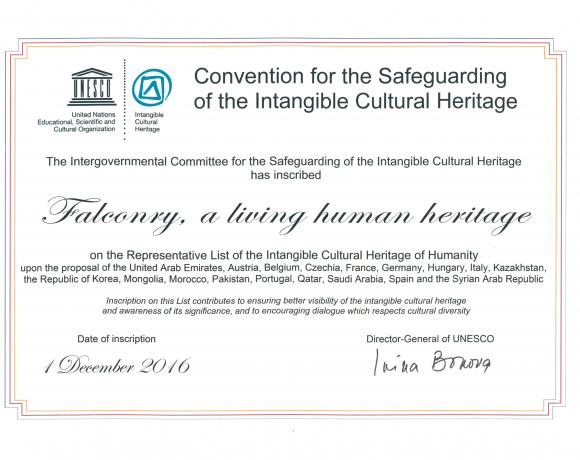UNESCO & Falconry
The United Nations Education, Science and Cultural Organization, one of the most prestigious organizations in the World; it does not make international laws, rather it encourages its member countries (signatory countries) to make laws about education, science and culture. There are a number of UNESCO conventions, including Intangible Heritage.
The Convention for the Safeguarding of the Intangible Cultural Heritage defines the intangible cultural heritage as the practices, representations, expressions, knowledge and skills, that communities, groups and, in some cases, individuals recognise as part of their cultural heritage. It is sometimes called living cultural heritage, and may include:
– oral traditions and expressions, including language;
– performing arts;
– social practices, rituals and festive events;
– knowledge and practices concerning nature and the universe;
– traditional craftsmanship.
The intangible cultural heritage is transmitted from generation to generation, and is constantly recreated by communities and groups, in response to their environment, their interaction with nature, and their historical conditions of existence. It provides people with a sense of identity and continuity, and its safeguarding promotes, sustains, and develops cultural diversity and human creativity.
The oral and intangible heritage has gained international recognition as a vital factor in cultural identity, promotion of creativity and the preservation of cultural diversity. It plays an essential role in national and international development, tolerance and harmonious interaction between cultures. In an era of globalization, many forms of this cultural heritage are in danger of disappearing, threatened by cultural standardization, armed conflict, the harmful consequences of mass tourism, industrialization, rural exodus, migration and environmental deterioration.
Falconry was added to the lists of the Convention for the Safeguarding of the Intangible Cultural Heritage on 16th November 2010. This was the culmination of over 6 years work by 11 nations, led by the authorities in the United Arab Emirates and including Belgium, Czech Republic, France, Korea, Qatar, Saudi Arabia, Syria, Mongolia, Morocco and Spain. Contributing international non-government organizations included the International Association for Falconry, International Council for Game and Wildlife Conservation, the Falconry Heritage Trust and the Archives of Falconry. A huge number of individuals gave freely of their time and expertise and professional consultants were also used.
It was the largest ever nomination in the history of the UNESCO convention. In a modern face paced world, UNESCO seeks to safeguard the intangible cultural heritage of humanity, and particular those arts and activities that are best paced on from one generation to the next through direct demonstration – showing by example – as opposed to learning through other mediums.
On 5th November 2008, IAF accreditation as an advisory organization was officially approved by the Intergovernmental Committee for the Intangible Cultural Heritage during its session-council of delegates. Since that date IAF is officially entitled to provide advisory services to the UNESCO ICH Committee under the scope of the convention. IAF belongs to the narrow group of international 45 accredited NGOs of which only about 5 NGOs are international, the rest are national. In principle the ICH Committee or its Subsidiary Body may ask approved NGOs for advisory capacity, especially when it is a dedicated matter beyond its knowledge and expertise. While there are many NGOs focusing on folklore, dancing, music etc, IAF is basically alone in its field. However NGOs not only serve as scientific/advisory/competent bodies, but also as a kind of independent ‘inspection’ to governmental organizations and State Parties.
With UNESCO recognition of the IAF as an advisory NGO, the IAF must continue to assist in preserving falconry as an intangible cultural heritage. IAF’s ongoing responsibility will be reevaluated every four years. in accordance with paragraph 94 of the Operational Directives. This ongoing commitment obligates the IAF to report periodically to maintain its advisory status.
Contact IAF for consultation.
Check if your country is a member of the UNESCO Intangible Cultural Heritage convention; many countries are not and elements may be inscribed by those countries which are. See: http://www.unesco.org/eri/la/convention.asp?KO=17116&language=E
Make efforts to inscribe falconry in your NATIONAL inventory list of intangible cultural heritage. This will require the creation of a documentation portfolio (including text, photos, videos, audios etc.) pursuant to national rules. The process of inclusion in a national inventory list of cultural heritage is individual to every country and every country has different requirements and deadlines.
To find out what national requirements are it will be necessary to contact and consult the UNESCO authorities/experts in your own country. The latest list of national UNESCO contacts may be found here: http://www.unesco.org/culture/ich/index.php?lg=en&pg=00430
Political support is also very desirable.
As soon as falconry is on the National inventory list, the country becomes eligible to become Global UNESCO heritage. Falconers should inform IAF for coordination, while national authorities should ask the UAE UNESCO authorities for the extension. In cases of multinational files, UNESCO does not communicate directly with each participating country, but rather it communicates via one coordinating country, in this case UAE, the leader of the original group of eleven countries.
On a practical level, the extension of the multinational file will require:
- The insertion of several sentences of specific information into each chapter of the existing documentation.
- The section of one specific photo and some 30-60 seconds video footage, both specific to falconry in your country.
Finally, every participating country has to agree with the extension so you need a letter from all the existing countries. You may contact IAF for addresses.
The deadline for any extension is the end of March each year. All the latest documentation can be downloaded from the UNESCO website: http://www.unesco.org/culture/ich/index.php?lg=en&pg=00011&RL=00732

